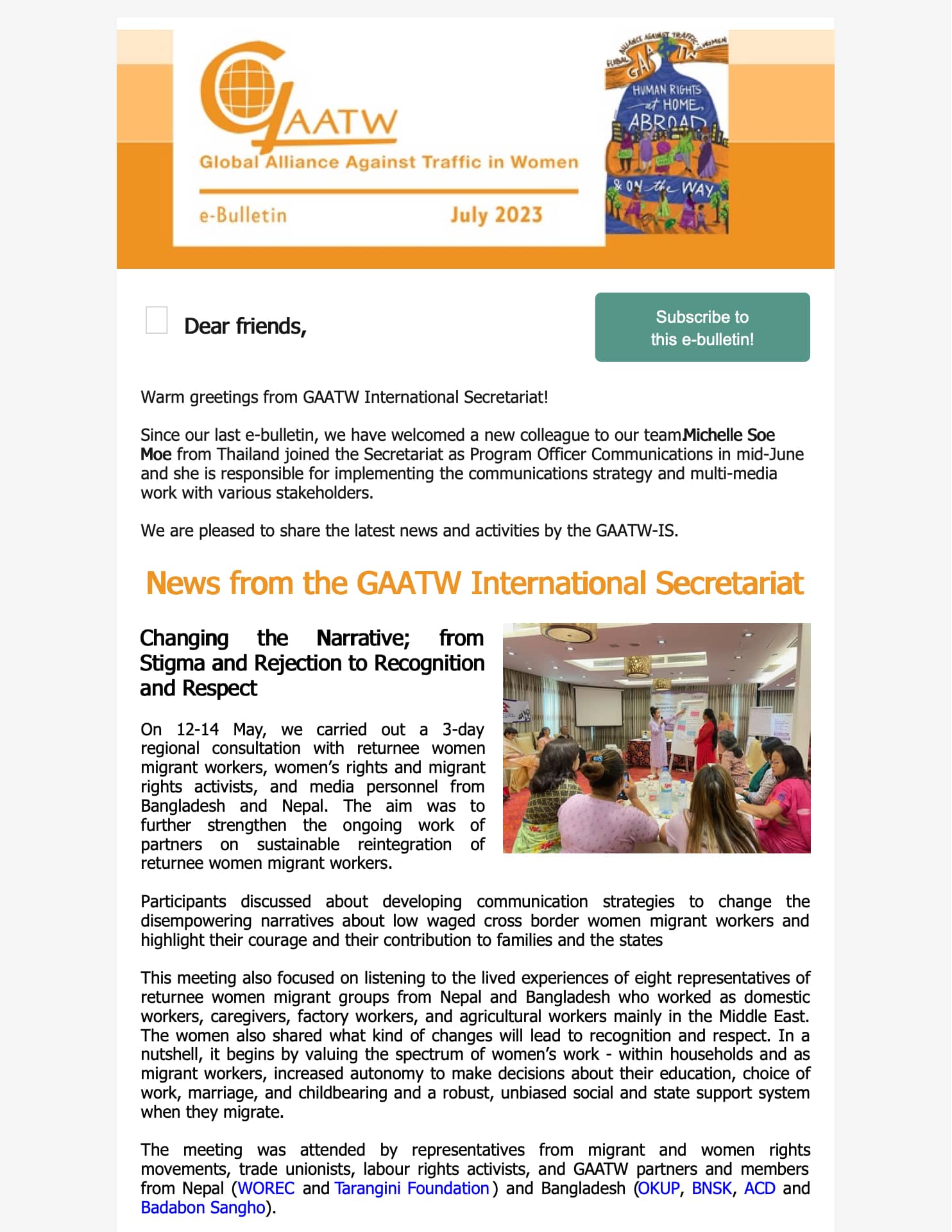
GAATW E-bulletin: Issue 3, July 2023
- Category: E-Bulletin
Dear friends,
Warm greetings from GAATW International Secretariat!
Since our last e-bulletin, we have welcomed a new colleague to our team. Michelle Soe Moe from Thailand joined the Secretariat as Program Officer Communications in mid-June and she is responsible for implementing the communications strategy and multi-media work with various stakeholders.
We are pleased to share the latest news and activities by the GAATW-IS.
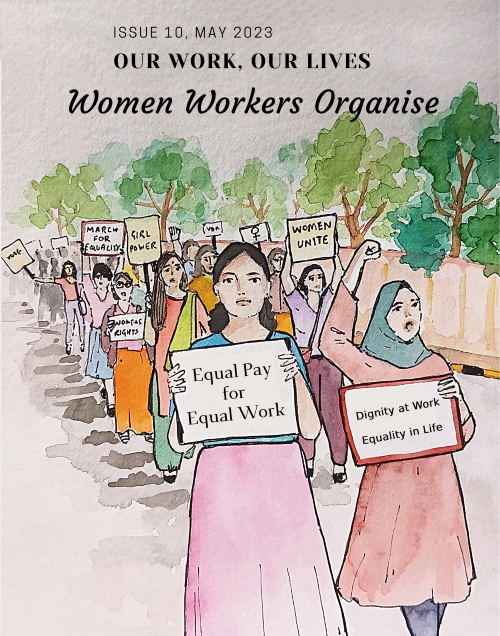
Issue 10: Women Workers Organise
- Category: Our Work, Our Lives
Dear friends,
We are pleased to bring you the May 2023 issue of Our Work, Our Lives which focusses on women workers’ organising.
In this issue we hear from community organisers and union leaders affiliated to AMKAS-Nepal, ARM-Lebanon, CHRCD-Sri Lanka, DoWan-Sierra Leone, ESCO-Sri Lanka, JALA PRT- Indonesia, OKUP-Bangladesh, OPSI-Indonesia, Tarangini-Nepal, WINS-India, WOFOWON-Nepal, MAP-Thailand, PTS-India and Yasanti-Indonesia.
Women who have returned after working as domestic workers (or in other low waged jobs) in foreign countries have collectivised to demand stronger social protection and a safe and fair labour migration regime. They are currently self-employed or working as daily wage labourers in their home countries. Even when there are accusations from male family members that they are ‘wasting time in girly gossip’, returnee women migrants have sought out each other’s company. Many of them have also enjoyed working in their communities. “I joined DoWan to avoid loneliness at home and get skills training to find a job,” says Kadiatu Patricia Ado from Sierra Leone. “Earlier I was known as someone’s daughter, sister, wife, or mother. Now I am a well-known face in my community, even in my district. I am one of the trusted persons in my society,” says Indira Kharel from AMKAS-Nepal. “Despite lack of recognition from the government, we have been able to create a culture of mutual support amongst ourselves and find a social niche for ourselves,” members of the Kurunegala Migrant Societies tell us.
There are stories of organising and unionising from women domestic workers, home-based workers, porters, entertainment workers, farmers, and sex workers. “When we started speaking as a group, things did change sometimes. Not big changes but at least the behaviour of male colleagues and employers changed a little. When we started to respect ourselves, we noticed that people also treated us with some respect in public places,” Ayushma KC, an entertainment worker leader from WOFOWON tells us. Erna Maria from Jogja City Homeworkers Federation explains that by joining the union, she learnt about workers’ rights and how to fight for it. Her words are echoed by members of the women farmers’ cooperative in Tirupati, India who say, “We thought that if we present our situation to policy makers as a group, there is greater possibility of being taken seriously.”
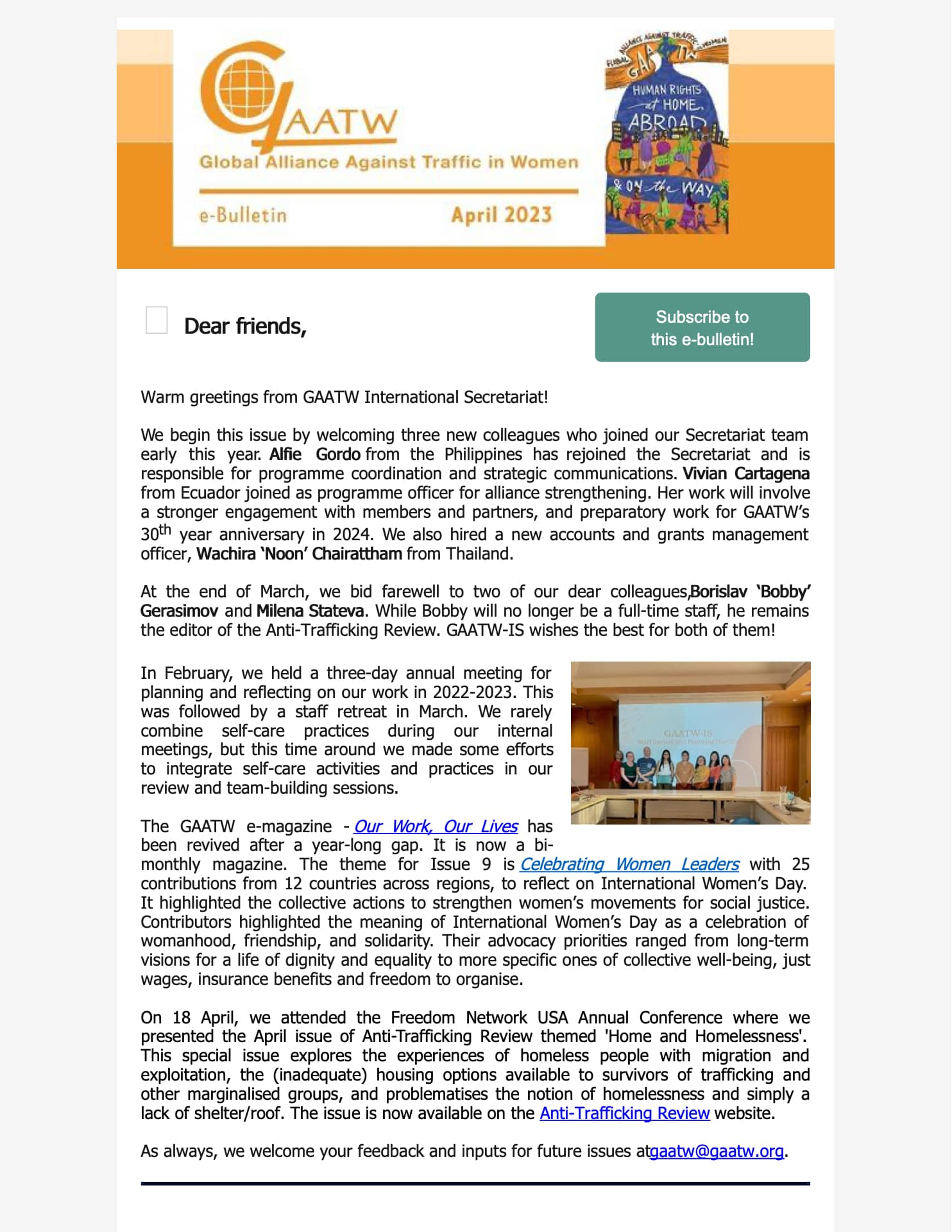
GAATW E-bulletin: Issue 2, April 2023
- Category: E-Bulletin
Dear friends,
Warm greetings from GAATW International Secretariat!
We begin this issue by welcoming three new colleagues who joined our Secretariat team early this year. Alfie Gordo from the Philippines has rejoined the Secretariat and is responsible for programme coordination and strategic communications. Vivian Cartagena from Ecuador joined as programme officer for alliance strengthening. Her work will involve a stronger engagement with members and partners, and preparatory work for GAATW’s 30th year anniversary in 2024. We also hired a new accounts and grants management officer, Wachira ‘Noon’ Chairattham Wachira ‘Noon’ Chairattham from Thailand.
At the end of March, we bid farewell to two of our dear colleagues, Borislav ‘Bobby’ Gerasimov and Milena Stateva. While Bobby will no longer be a full-time staff, he remains the editor of the Anti-Trafficking Review. GAATW-IS wishes the best for both of them!
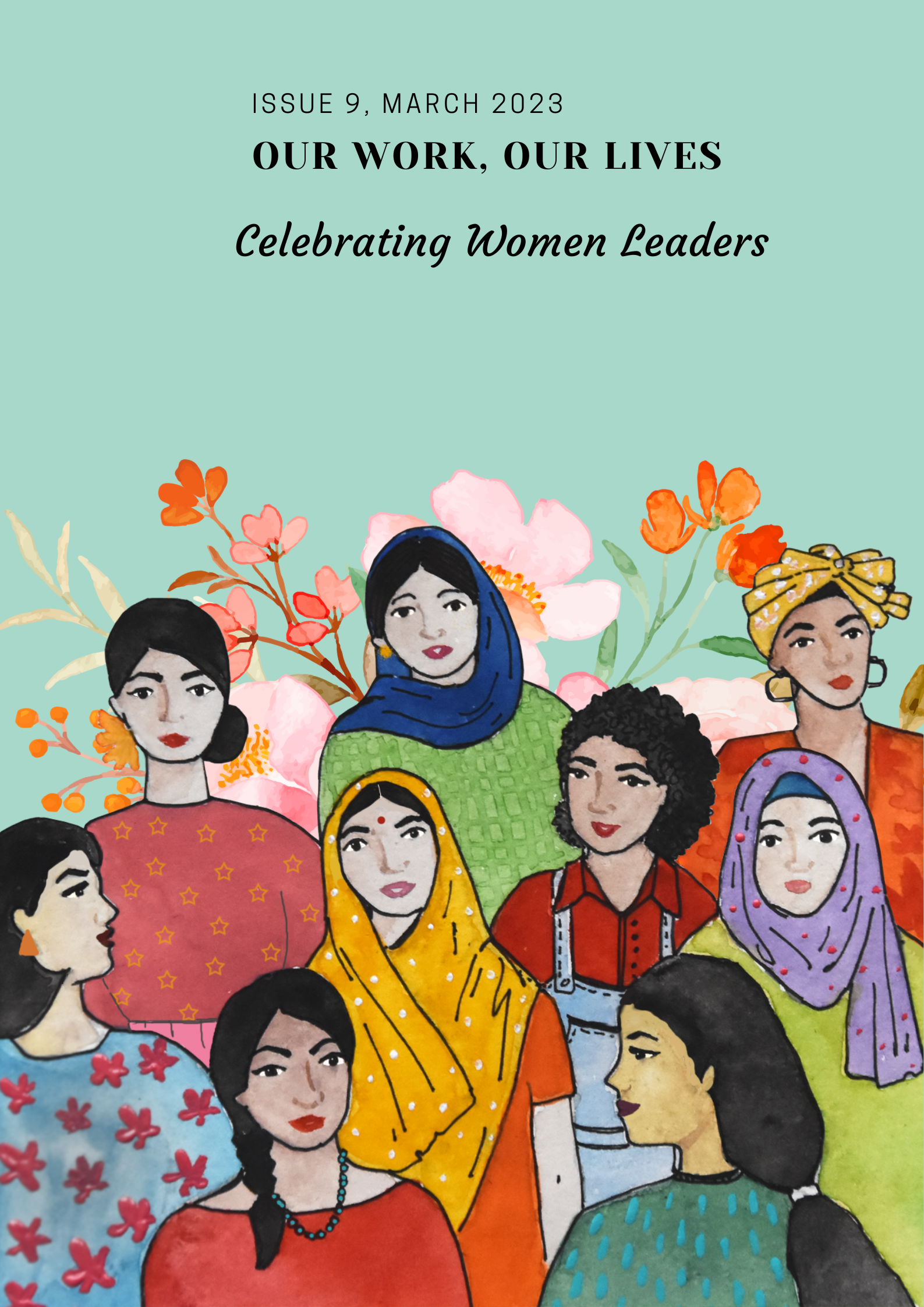
Issue 9: Celebrating Women Leaders
- Category: Our Work, Our Lives
Dear friends,
We are back with the March 2023 issue of Our Work, Our Lives after a gap of one year. From now onwards, the e-magazine will be published bi-monthly.
As before, it will bring the voices, concerns and priorities of women workers.
In preparation for this issue, we requested our members and partners from organised groups of women workers to respond to two simple questions. We wanted to know what significance, if any, 8 March has for them and what their priorities for 2023 are. Twenty-five contributions from twelve countries across Asia, Europe and Latin America reached us. It was heart-warming to note that 8 March is celebrated by all the groups to strengthen women’s movements for social justice. For all our contributors, the day is also a celebration of womanhood, of friendship and solidarity. Priorities range from long-term visions for a life of dignity and equality to more specific ones of collective well-being, just wages, insurance benefits and freedom to organise. We hope you enjoy reading the magazine as much as we enjoyed putting it together.
Do write to us with your comments, suggestions, or stories for upcoming issues at
Warmly,
GAATW-IS team
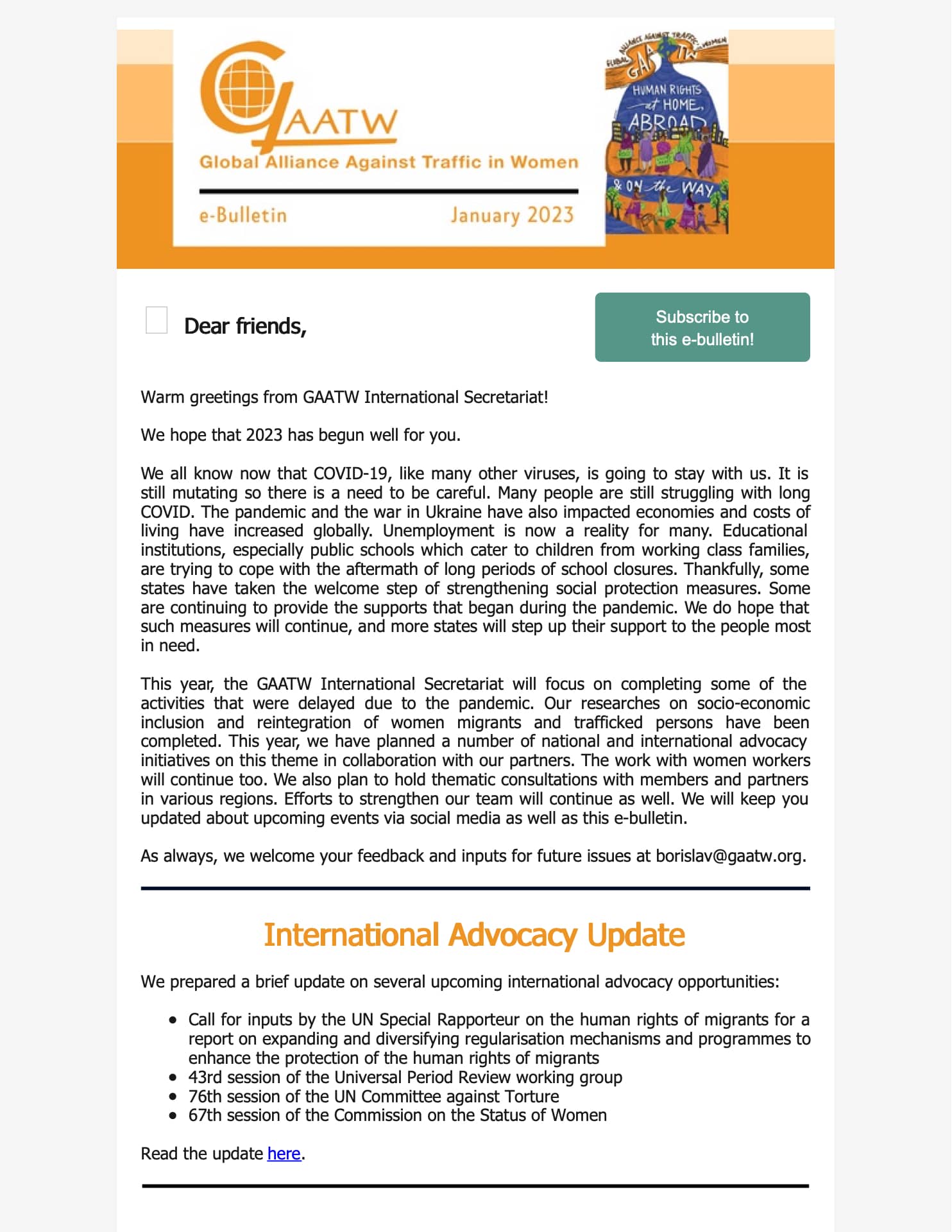
GAATW E-bulletin: Issue 1, January 2023
- Category: E-Bulletin
Dear friends,
Warm greetings from GAATW International Secretariat!
We hope that 2023 has begun well for you.
We all know now that COVID-19, like many other viruses, is going to stay with us. It is still mutating so there is a need to be careful. Many people are still struggling with long COVID. The pandemic and the war in Ukraine have also impacted economies and costs of living have increased globally. Unemployment is now a reality for many. Educational institutions, especially public schools which cater to children from working class families, are trying to cope with the aftermath of long periods of school closures. Thankfully, some states have taken the welcome step of strengthening social protection measures. Some are continuing to provide the supports that began during the pandemic. We do hope that such measures will continue, and more states will step up their support to the people most in need.
This year, the GAATW International Secretariat will focus on completing some of the activities that were delayed due to the pandemic. Our researches on socio-economic inclusion and reintegration of women migrants and trafficked persons have been completed.
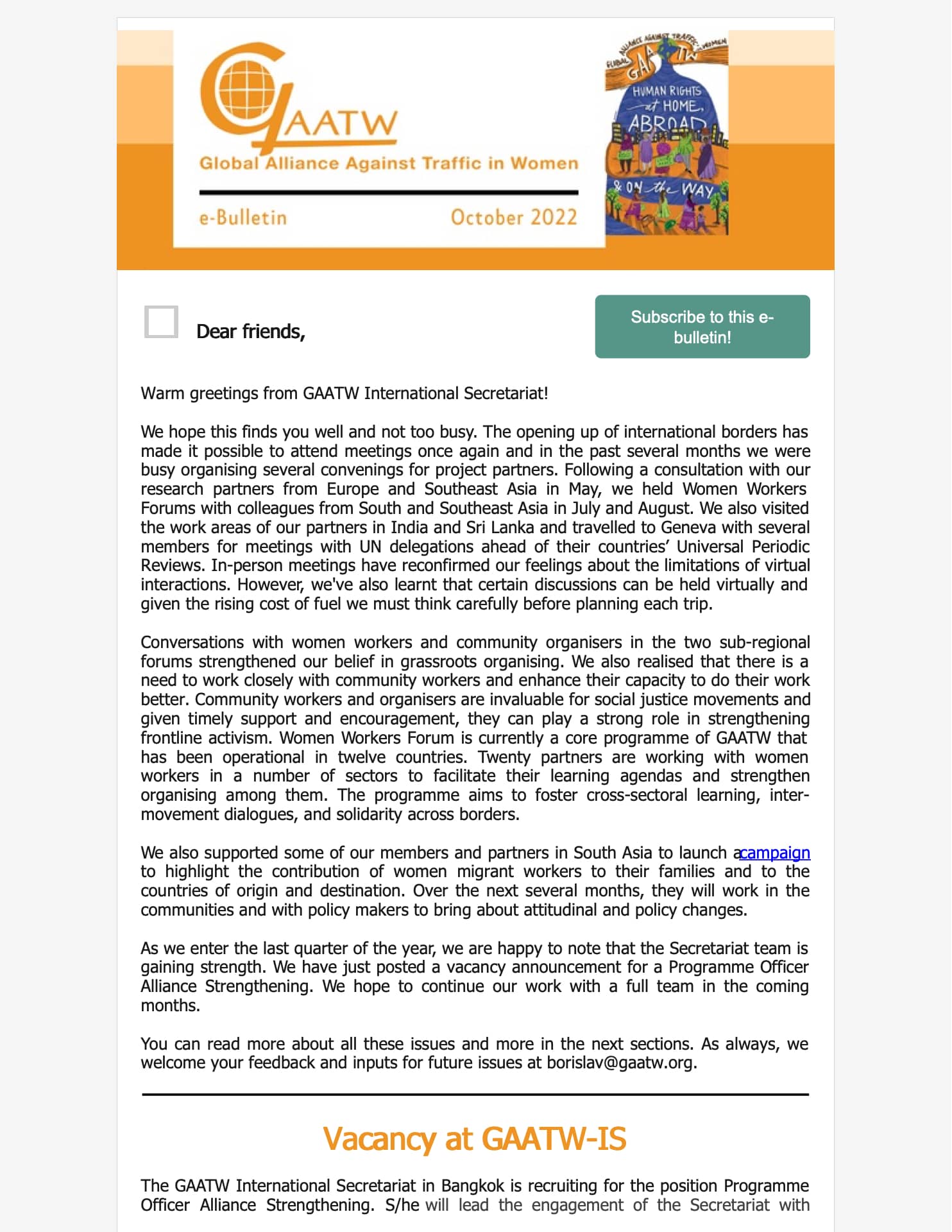
GAATW E-bulletin: Issue 3, October 2022
- Category: E-Bulletin
Dear friends,
Warm greetings from GAATW International Secretariat!
We hope this finds you well and not too busy. The opening up of international borders has made it possible to attend meetings once again and in the past several months we were busy organising several convenings for project partners. Following a consultation with our research partners from Europe and Southeast Asia in May, we held Women Workers Forums with colleagues from South and Southeast Asia in July and August. We also visited the work areas of our partners in India and Sri Lanka and travelled to Geneva with several members for meetings with UN delegations ahead of their countries’ Universal Periodic Reviews. In-person meetings have reconfirmed our feelings about the limitations of virtual interactions. However, we've also learnt that certain discussions can be held virtually and given the rising cost of fuel we must think carefully before planning each trip.
Conversations with women workers and community organisers in the two sub-regional forums strengthened our belief in grassroots organising. We also realised that there is a need to work closely with community workers and enhance their capacity to do their work better.
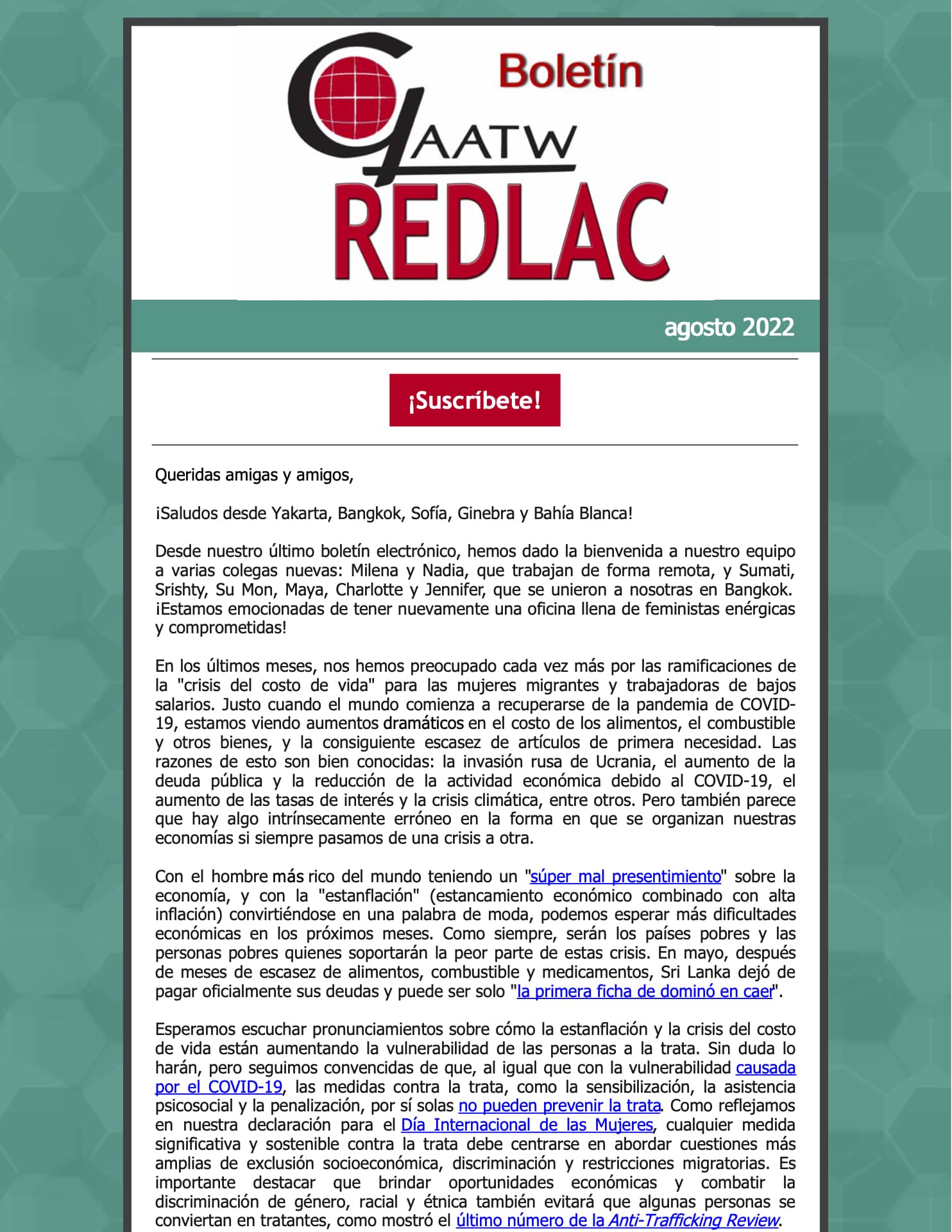
Boletín en español, Agosto 2022
- Category: E-Bulletin
Queridas amigas y amigos,
¡Saludos desde Yakarta, Bangkok, Sofía, Ginebra y Bahía Blanca!
Desde nuestro último boletín electrónico, hemos dado la bienvenida a nuestro equipo a varias colegas nuevas: Milena y Nadia, que trabajan de forma remota, y Sumati, Srishty, Su Mon, Maya, Charlotte y Jennifer, que se unieron a nosotras en Bangkok. ¡Estamos emocionadas de tener nuevamente una oficina llena de feministas enérgicas y comprometidas!
En los últimos meses, nos hemos preocupado cada vez más por las ramificaciones de la "crisis del costo de vida" para las mujeres migrantes y trabajadoras de bajos salarios. Justo cuando el mundo comienza a recuperarse de la pandemia de COVID- 19, estamos viendo aumentos dramáticos en el costo de los alimentos, el combustible y otros bienes, y la consiguiente escasez de artículos de primera necesidad. Las razones de esto son bien conocidas: la invasión rusa de Ucrania, el aumento de la deuda pública y la reducción de la actividad económica debido al COVID-19, el aumento de las tasas de interés y la crisis climática, entre otros. Pero también parece que hay algo intrínsecamente erróneo en la forma en que se organizan nuestras economías si siempre pasamos de una crisis a otra.
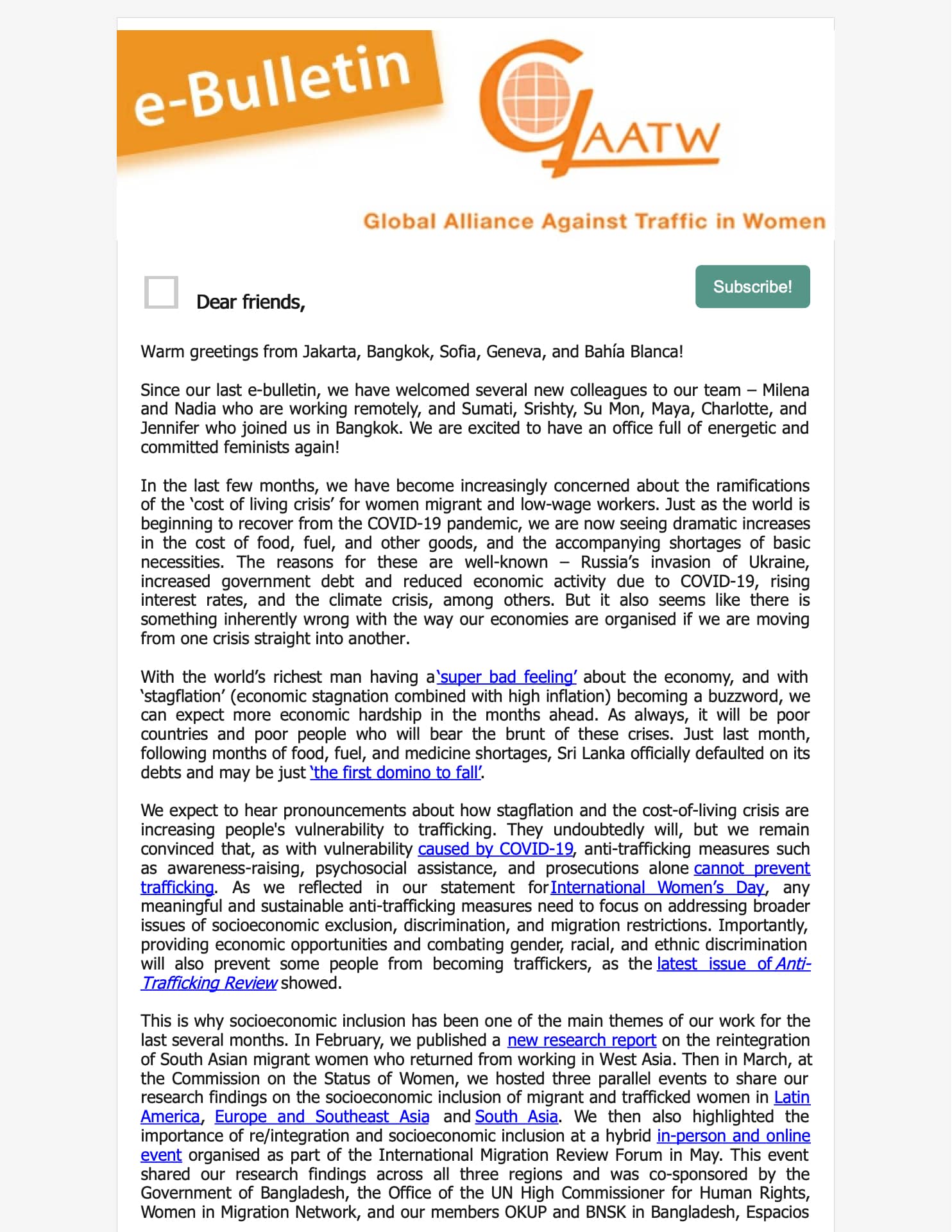
GAATW E-bulletin: Issue 2, June 2022
- Category: E-Bulletin
Dear friends,
Warm greetings from Jakarta, Bangkok, Sofia, Geneva, and Bahía Blanca!
Since our last e-bulletin, we have welcomed several new colleagues to our team – Milena and Nadia who are working remotely, and Sumati, Srishty, Su Mon, Maya, Charlotte, and Jennifer who joined us in Bangkok. We are excited to have an office full of energetic and committed feminists again!
In the last few months, we have become increasingly concerned about the ramifications of the ‘cost of living crisis’ for women migrant and low-wage workers. Just as the world is beginning to recover from the COVID-19 pandemic, we are now seeing dramatic increases in the cost of food, fuel, and other goods, and the accompanying shortages of basic necessities. The reasons for these are well-known – Russia’s invasion of Ukraine, increased government debt and reduced economic activity due to COVID-19, rising interest rates, and the climate crisis, among others. But it also seems like there is something inherently wrong with the way our economies are organised if we are moving from one crisis straight into another.
